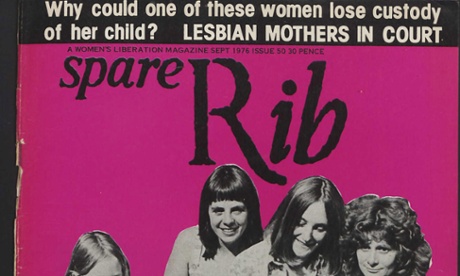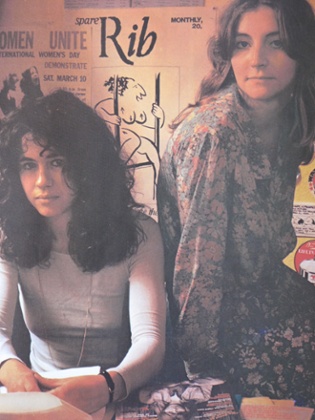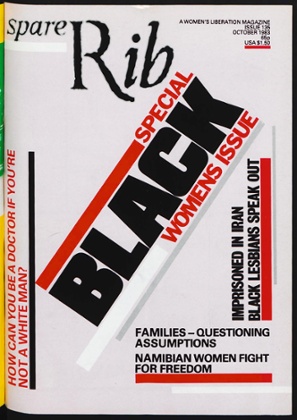
‘It is a genuine surprise to discover its lightness’
When you look over back issues of Spare Rib, a number of things strike you about feminism and how it has changed; I would say that they are depressing and heartening in the ratio of roughly 9:1. To start with the good news, it is salient to remember how much change has been wrought in terms of individual rights. There are cases in the news pages that make your jaw hang open: a woman fired from her job for wearing a badge that said “lesbians ignite”, judgments handed down that dripped with contempt, not just for women who were gay but for women who worked, women who unmeekly existed. We have come further than we think. Equal pay is not the only win; there have been less measurable but more important victories in the realm of how much casual misogyny you can say out loud while remaining in the broad category of civilised society.
However, it also quickly becomes plain how much has not been achieved. “Women Under Attack: Tories Cut Maternity Leave” could sit happily in the Mirror, and would be the meat and drink of newer media. The vulnerability of the pregnant woman in the workplace; the outrageous knife-edge on which the fertile woman exists, supported by political rhetoric only for as long as she serves an electoral purpose; the way transgression is amplified by motherhood, so that mothers are punished doubly for any crime or misdemeanour – none of that has changed at all. Given its hopefulness, its sense of possibility and the nearness of change, reading the magazine today is depressing.
And if you find that dispiriting, sadder still is how the all the slurs lobbed at the second-wave – humourlessness and man-hating, in an endless variety of guises – managed to stick, so it is a genuine surprise to discover its lightness, its self-parody, the openness, the warmth, the big-heartedness, the caustic hilarity, the confidence and the robustness. The era, with the magazine as its emblem, has for too long been painted as a necessary but rather joyless, wholemeal staging post on the mountain path to equality. In fact, while there are some recipes that read like a survival guide for a post-nuclear dystopia, the atmosphere is carnivalesque: a thinking person’s carnival, with a real sense of direction. Zoe Williams
‘It was the feminist blog of its day’

It was with great curiosity that I called up the British Library’s collection of Spare Rib magazines from storage in 2013. All 239 issues arrived at my desk on a single trolley. I started flicking through them. Three hours later, I was still reading.
Few titles sum up an era and a movement like Spare Rib. With its commitment to challenging the status quo, the magazine battled oppression and gave a voice to the struggles of diverse groups of women over the 21 years it was in print (1972-1993).
Spare Rib was bold in design, content and tone, and set out from the start to challenge, debate and discuss everything from the politics of housework to the situation for women in El Salvador to the rights of lesbian mothers. In doing so it courted inevitable controversy, including being banned by newsagent WH Smith, and by the Republic of Ireland, in the 1970s.
In many ways, it was the feminist blog of its day. Its letters pages were brimming with dialogue between readers. It posted information about forthcoming conferences, demos, meetings and events, bringing together a community of women from all backgrounds in a way that was, then, revolutionary.
One of the biggest surprises for me, coming back to the magazine, was how fresh it remains. Funny, irreverent, intelligent and passionate; a product of its time yet somehow timeless. As the British Library makes every edition of Spare Rib available to read online for free, I hope modern readers will be inspired by its sense of outrage, as well as its compassion and humour. Here are my 10 favourite old reads from the new site.

Hairy Story, issue 66 (January 1978), by Alex Balsdon and Eva Kazulynska
When “research” was published in a mainstream women’s magazine suggesting that women who worked were more likely to become hairy, Spare Rib hit back. Illustrated with a classic Posy Simmonds cartoon, Spare Rib’s indignant, yet informative, response combined spoof adverts for “Shock-o-hair” with serious advice on the causes of hirsutism.
Rape When a woman says NO, issue 212 (May 1990), by Maureen O’Hara
Notions of consent may have changed in the 25 years since this was published, but there is still a long way to go. It will make your blood boil.
What offends one of us won’t offend the next chap, issue 72 (July 1978), by Pat Moan and Jill Nicholls
Spare Rib was well ahead of the game in criticising sexist advertising. In a striking echo of the recent Protein World poster protest, this article puts the Advertising Standards Agency under fire over adverts such as one for a male perfume: “Mandate: All the Power a Man Needs.”
Bodysnatchers, issue 100 (November 1980), by Lucy Toothpaste
The magazine was committed to arts coverage and became a platform for debates about sexism in music. In the late 70s and early 80s, when punk had exploded on to the music scene, Spare Rib wrote about women-only bands, as in this piece on the Bodysnatchers.
Black women together, issue 87 (October 1979), by “O” (thought to be the Organisation of Women of Asian and African Descent)
A really great model for shared political action across different grassroots campaigns, the optimism, energy and excitement in this report on the 1979 Black Women’s Conference is palpable. The piece states that the conference, which brought together 300 black women from disparate action groups, “testifies to our belief that our common experience as second class citizens in contemporary Britain, as well as our joint history as victims of colonialism and imperialism, represents a bond between us which far outweighs ethnic and cultural differences which may exist.”
Family Everafter, issue 5 (November 1972), by Micheline Wandor
From FGM to abortion to housework, Spare Rib examined the politics of being a woman. Here, the household and family are put under the feminist microscope.
Beaten up women and their children, issue 12 (June 1973), by Jill Tweedle
Spare Rib was the first mainstream media outlet to document and take seriously the horrors of domestic abuse. This piece hears from the women seeking safety in one of Britain’s first refuges. It remains moving, powerful and relevant.
Taking control of our sex lives, issue 104 (March 1981), by Angela Hamblin
Sex and sexuality were discussed in Spare Rib with a candour and directness that is refreshing even 40 years on. In this article, women describ the difficulties and delights of their sexual experiences, from the politics of the term “foreplay” to the joys of masturbation. It ends: “Our days of sexual serving are over.”
Lesbians laying down the law, issue 175 (February 1987), by Jan Parker
If there is one example of how far we have come in the UK, then it is in coverage of LGBT sexuality. This article includes heartbreaking accounts of lesbians losing custody of their children. As late as 1987, it was still legal to sack someone for being gay.
Abortion, the feelings behind the slogans, issue 87 (October 1979), by Eileen Fairweather
Never shy to confront the complex and contradictory, this landmark article insists on the personal as political – and vice versa. Written twelve years after the 1967 Abortion Act, it asserts that “the generation of women now in their 20s and 30s are the first ever to be able to view pregnancy with anything less than stricken fear … whatever women have gained, we have had to fight for.” Polly Russell







